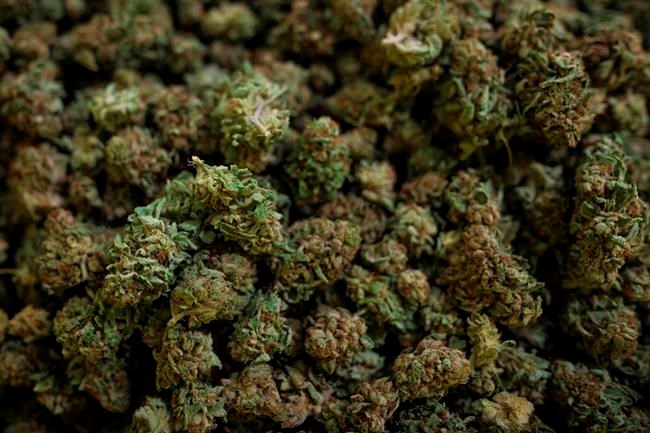B.C. has put in place its final rules around cannabis, paving the way for the legalization of marijuana next week.
The government set specific new orders on store licences, fines, suspensions and places to consume cannabis, as part of six new or amended provincial regulations. The rules, which follow legislation passed this spring set the stage for the federal government to legalize marijuana next Wednesday.
“Oct. 17 is coming and we know this is not the beginning and the end, but rather just the start of what will be an evolutionary process,” Solicitor General Mike Farnworth told reporters at the legislature last week.
Nonetheless, Farnworth said he worries about “consequences we haven’t thought of” and “issues that will spring up” once legalization occurs.
“Those are the kind of things that keep me awake at night,” he said. “But we’ve got the legislation in place, we’ve got the framework in place. Local government, I think, has done a terrific job in terms of getting themselves ready.
“We know it’s been a tight timeline, we know there‘s local government elections. This is the biggest public policy shift in this country in decades, so its exciting. But it’s like anything that’s new: There is going to be some hiccups along the way and that’s just a fact of life.”
B.C. had already set the legal age for cannabis at 19, and the maximum amount a person can possess in public at 30 grams. The new regulations also set a maximum household possession of 1,000 grams.
The government has banned the smoking or vaping of marijuana in provincial parks, near schools, in vehicles, on boats, near bus stops, inside public buildings and within six metres of any doorway, window or air intake.
The new regulations clarify that people with medical certificates for marijuana use are in some cases exempted from those bans — for example, a person could smoke on school grounds with the proper medical documentation and permission from the school district. Consuming marijuana inside a motorhome is allowed if it’s being used as a permanent or temporary residence, and smoking on a boat is OK if the boat is equipped with sleeping accommodations, cooking facilities, a toilet and is moored or anchored at the time.
There will only be one store in B.C. to purchase cannabis from when it becomes legal on Wednesday — a government-run store in Kamloops. Farnworth said more than 100 private retailers have applied for licences, but they require municipal consent and local government officials have told him that’s more likely to occur quickly after the Oct. 20 municipal elections.
The new regulations are also more specific on cannabis fines. The government can, for example, levy a $230 ticket for smoking in a prohibited place (the fine is only $58 for vaping) and $109 for smoking in a vehicle near a minor.
Private stores, once approved, will face strict licensing conditions on sales and record-keeping. Separate licenses are required to market and advertise cannabis. Companies that break the rules face fines up to $100,000 and individuals could face up to 12 months of imprisonment.
A pot shop that illegally sells, possesses or gets its supply from an unlawful source faces fines between $15,000 and $50,000, as well as license suspensions of between 15 and 90 days depending on whether they have violated other rules in the previous 12 months.
Customers aren’t allowed to light up in the store after buying marijuana, or the business could face up to $15,000 in fines and a 15-day suspension of its retail license. Businesses can appeal if they think the penalty was unfair, but that comes with a $500 “reconsideration fee.”
Former B.C. health minister Terry Lake, now a vice-president at Quebec-based marijuana company Hydropothecary, has advised Farnworth on the marijuana framework.
Lake said that while the country has a hodgepodge of different models and rules, B.C. has struck a good balance: “I think B.C. has taken a common-sense approach, which is the same rules that apply to tobacco and e-cigarettes apply to vaping and smoking cannabis.”
Lake said Farnworth’s approach has “been quite thoughtful” in that private retailers who operated in a grey area of legality in the past won’t be disqualified from applying for new licences. But he said the province could go further by considering marijuana-friendly bars and gathering spaces where people can consume together socially, as they do with alcohol.
B.C. will apply a 15 per cent markup to marijuana on its retail shelves. Combined with five per cent federal GST, a seven per cent provincial sales tax and a 2.3 per cent regulatory recovery fee from Health Canada, Lake said he’s worried legal marijuana might be too expensive and drive consumers back to the black market. But he said those concerns, as well as other wrinkles in licensing and regulations, will be ironed out over time.
“This industry, this business will mature over the next three to five years,” he said.
The new regulations come as the B.C. government seeks to craft workplace rules for its more than 25,000 civil servants. The province said it is working to update its workplace impairment rules for Oct. 17, but employees are obligated to report any form of impairment by drugs or alcohol to their supervisor, who will then take matters such as how long it has been since that person consumed pot into consideration in determining if employees are fit to work.
Farnworth has said B.C. will have enough supply from producers when legalization occurs, and is working with the federal government to address concerns that British Columbians who work and invest in the marijuana sector might be barred from entering the United States.
“There will be product,” said Farnworth.
“But it’s like anything. If a particular wine from a small winery in the Okanagan proves to be particularly popular, it could sell out very fast. Likewise we may see the same thing in cannabis, that particular strains or varieties may sell out quite quickly.”



